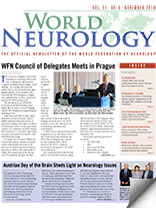By Christopher Gardner-Thorpe, MD
It would be trite to say that at no time have good international relations been more necessary than now. We live largely in communities, and, ultimately, everything we do is dependent upon the consent of others. We can achieve our human aims peacefully or by the alternative approach. Hence relations between all of us as individuals, as communities, and as nations, need to be nurtured — and this involves compromise.
Neurology affects all persons too, because we are all at risk of neurological disorders, and the specialty affects us professionally as well in our everyday jobs. Good relations between professionals are essential, as are relationships between professionals and their patients.
The neurological community worldwide is well served by local groups and societies in each country and further afield. For example, the formation of the European Academy of Neurology by the coming together of the European Federation of Neurological Societies and the European Neurological Society demonstrates how on one continent, Europe, like-minded persons can come together to exchange ideas and promote good practice and good research. Communication between individuals is vital in professional life (as it is in personal life), whether face-to-face or by means of messages on paper or increasingly by electronic means. How can we facilitate the interactions between all of us who desire increased cooperation and friendship too?
International relations are enhanced by the work of organizations, including the World Federation of Neurology (WFN) with its network of contacts throughout the globe and its conferences. The publication of World Neurology offers a site for the sharing not only of information but of ideas too. The WFN is not an overtly political organization and does not engage to any significant extent in polemics. The organization made great strides during each presidency and perhaps especially during that of the late Lord John Walton, MD, who made many radical contributions to much of neurology and its science. The memorial service for Dr. Walton in early November brought many messages of support for the promotion of international relations.
Many others have promoted good international relations extending over the 20th century. The International Society for the History of the Neurosciences and the International Society for the History of Medicine, whose new president is Carlos Viesca, MD, of Mexico City, bring to communication a slightly different focus than the strictly scientific study of neurology. There is no real doubt that to study the history of our subject is to increase understanding of where we have come from and more important, why, and to help us understand how to advance further. It is not only instructive in this manner but also a good academic discipline, and enjoyable in the process — the three principles of the study of medical history. We might ask, to what extent can we learn from each other’s heritage? Surely a great deal. Failed eponymists, those whose names should have been given to the first discovery or description of something, abound. An example is the description of Duchenne muscular dystrophy to which perhaps prior description should be attributed to Edward Meryon, buried in Brompton Cemetery in London. The Dax/Broca puzzle, the Bell/Magendie controversy, and the Darwin/Wallace debate are all examples of who should have prior acknowledgement; many others examples stretch across the world. Inappropriate arguments about this and that can either sour international relations or lead to harmonious resolution, a sort of dialectic where thesis is followed by antithesis and then by synthesis. We should make the most of these opportunities to debate and inform each other.
What part do physicians play in the promotion of national and international peace? A great deal is possible — the Nuremberg Code, and discussions about physicians’ part in capital punishment and in war are examples. Recent strike action by physicians in the United Kingdom has been unprecedented, never before seen, and followed by the understanding that similar follow-up action would lead to more harm to patients, and, of course, to the profession, and the policy abandoned. The government also needs to learn that compromise is important and not to exploit a near-monopoly position within a government-controlled service for ill-founded statistical reasons, despite the many advantages that such a service holds for the population, since each of us is at one time either sick, potentially sick, and always in need of proper health care.
The planned exodus of the United Kingdom from the European Union (but not from Europe since that is a geographical matter) will change many aspects of health care. On the one hand, there will be greater frfeedom to control the ways in which governments act. On the other hand, the controls that come from being part of a larger community (the European Union) will be relinquished. The law of unintended consequences will have free reign with lots of heart-searching afterward.
There are many facets to our need to promulgate relations between nations and the manner in which we can promote these bonds. Within medicine, we see many possibilities for shaping the health and happiness of human beings, and shifting forces should make us wary and constantly vigilant to new opportunities. Our Strengths and Weaknesses bring Opportunities and Threats – the SWOT analysis. As medics and others who take part in health care, we must make the most of our strengths and opportunities by fostering our international relations, since these are precious and could so easily be lost by inaction, as well as by inappropriate actions.
